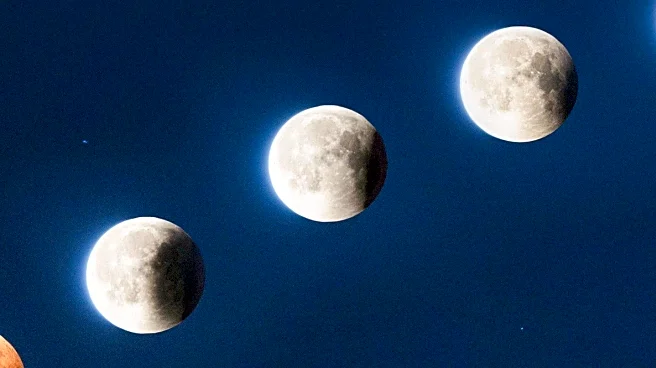What is the story about?
What's Happening?
September offers a series of notable celestial events, as highlighted by National Geographic. Among these is a total lunar eclipse on September 7, which will turn the moon a striking blood red for 82 minutes. This event will be visible in its entirety from regions such as Asia, the east coast of Africa, and western Australia. However, viewers in the Americas will miss the eclipse due to the moon rising too late. Additionally, the month will feature a partial solar eclipse visible in the southern hemisphere, and bright planets like Saturn, Neptune, and Jupiter will be prominent in the night sky. These planets will reach peak brilliance and engage in notable alignments with the moon, providing excellent viewing opportunities for skywatchers.
Why It's Important?
These celestial events are significant for astronomers and enthusiasts alike, offering rare opportunities to observe phenomena that are not frequently visible. The total lunar eclipse, in particular, is a dramatic event that captivates viewers with its unique visual transformation of the moon. Such events can inspire interest in astronomy and science, encouraging educational activities and public engagement with the natural world. Additionally, these occurrences can have cultural significance, as eclipses have historically been associated with various myths and traditions across different societies.
What's Next?
Skywatchers and astronomers are likely to prepare for these events by organizing viewing parties and educational sessions to maximize public engagement. Observatories and science centers may offer special programs to educate the public about the science behind eclipses and planetary movements. As these events unfold, they may also be documented and shared widely through media and social platforms, further increasing public interest and awareness.
Beyond the Headlines
Beyond the immediate spectacle, these celestial events can serve as a reminder of the vastness and complexity of the universe. They offer a chance to reflect on humanity's place within the cosmos and the ongoing quest for knowledge about our solar system and beyond. Such reflections can foster a deeper appreciation for scientific inquiry and the importance of preserving our night skies from light pollution.















